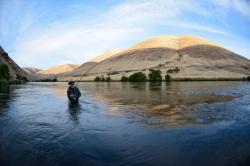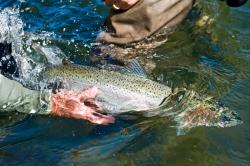Steelhead, Smallmouth Bass and the Importance of Public Lands
Today’s feature comes to us from the Theodore Roosevelt Conservation Partnership, and explores a question that applies in many parts of the nation right now as both federal and state land management agencies feel the squeeze of tightened budgets.
by Theodore Roosevelt Conservation Partnership
from The Fishing Wire
Do you have a secret spot you like to access to fish your favorite run? Maybe your spot is accessed through public BLM or Forest Service land?
Image courtesy of Marty Sheppard/Little Creek Outfitters.
I have a few spots like this and remember a place I use to hike to that later was closed to the public. I remember thinking in frustration, “How could someone do that?” As a sportsman, outfitter and mother, I believe that one of the most important challenges of our time is to maintain public access to places we like to fish. I want my daughter to enjoy the same experiences and opportunities that I have had.
Some of the state’s best fishing for steelhead, trout and smallmouth bass occurs on rivers and lands managed by the Bureau of Land Management and U.S. Forest Service.
For example, the John Day River is the third longest undammed river in the Lower 48. It also is a stronghold for wild steelhead. The John Day is in my backyard, and, as a local fishing outfitter, I take pride in sharing this river with visitors and other anglers.
My husband and I have outfitted on the John Day River since 2001 and annually bring close to 180 people to our community, where they fish, shop, stay in hotels and eat at local restaurants. Anglers are mesmerized by the rimrock canyons, smell of juniper and solitude experienced on a John Day River float. These experiences connect visitors with something greater than themselves while at the same time support a major component of Oregon’s rural economy. Public lands are a boon for those who travel from across the country to enjoy them, as well as those who call these places home.
A couple years ago, I met a hunter who believed the balance between federal and local control of public lands in southeast Oregon was skewed in the wrong direction. As we talked about public lands in Oregon, he said, “We need to take back the management of our land from the federal government and have states control it.”
At the time I wasn’t aware of the debate over public lands management that was happening in Utah and other Western states, where legislative efforts are under way to turn federal public lands over to the states.
I replied, “Are you sure that is a good thing? What will happen to our wildlife and habitat? Will that impact our access to hunting and fishing?”
His simple response: “We’ll still be able to do all that.”
I couldn’t agree with him then, and, knowing what I do now, I maintain that our public lands should continue to be managed by the federal government.
Like many other Oregonians, I view federally managed public lands as my playground. Hunters and anglers come from all over to experience the high-quality hunting, fishing and solitude available on public lands in Oregon. As a professional guide, I depend on my continued ability to share the beauty of our public lands with folks from across our great nation. These lands and other federal lands across Oregon provide wide-reaching economic benefits to individuals like me and other Oregonians who rely on outdoor opportunities for income.
The federal government holds these public lands in trust so current and future generations can enjoy the rich beauty and resources that they offer. If ownership of these resources were transferred to the states, the expense of managing them could be prohibitive, leading to their eventual sale to private interests. This scenario would likely result in the widespread loss of public access to these uniquely American lands and waters.
Public lands rightfully belong to the citizenry, including Oregonians who depend on them for quality habitat for fish and wildlife, access to abundant hunting and angling and economic security. In an increasingly crowded West where open space is rapidly becoming one of the rarest and most valuable assets of the Western lifestyle, ensuring that these lands stay in the public trust is more important now than ever before.
To support sportsmen’s access to our public lands, please visit www.sportsmensaccess.org and sign the petition.
TRCP’s Oregon Field Representative Mia Sheppard lives and breathes being on the water and chukar hunting the breaks of desert rivers. Her passion to share this with others has inspired her to become a two-time distance-casting champion, teacher of fly-fishing, and advocate for women and kids in hunting and fishing. Mia and her husband Marty Sheppard (rod caddy) own Little Creek Outfitters, guiding fly-fishing trips on Oregon rivers. When she isn’t working for the TRCP she can be found standing in a river with her husband or daughter chasing steelhead or planning the next adventure.
About Theodore Roosevelt Conservation Partnership
TRCP guarantees all Americans quality places to hunt and fish by uniting and amplifying their partners’ voices to strengthen federal policy and funding. For more info. visit www.trcp.org

